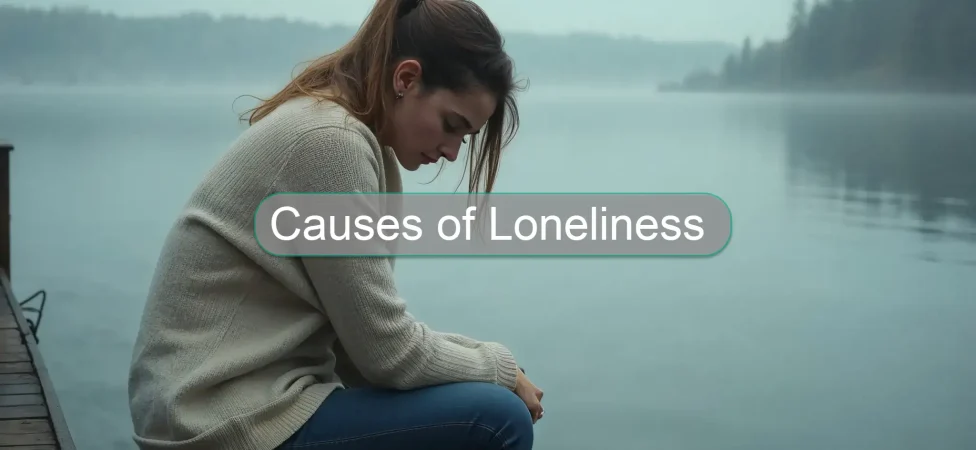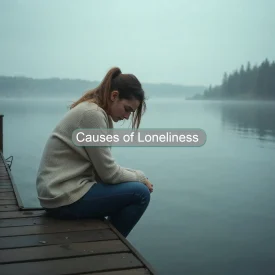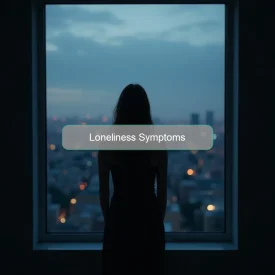Feeling lonely even in a crowded room is more common than you might think. That empty ache of disconnection hits hard, and it’s more than just solitude. With advancing technology, innovative solutions like an AI girlfriend can offer companionship. See how it can help fill the emotional void, explore What is an AI girlfriend.
The causes of loneliness range from psychological factors like depression or anxiety, to social issues like breakups, big life shifts such as moving or retiring, health challenges, societal pressures, too much screen time, and even some biological factors.
The tricky part is that these triggers often pile up, turning a temporary feeling into something overwhelming. But spotting them early can make all the difference in turning things around.
Key Takeaways
- Loneliness comes from many sources, like depression or breakups.
- Big life changes like moving or retiring can make you feel alone.
- Health issues, aging, or unfair treatment increase loneliness.
- Too much social media causes comparisons and less real talk.
- Act early on loneliness to avoid depression by talking to others or getting help to feel connected.
Psychological Causes of Loneliness
Psychological factors often play a big role in feeling lonely. They affect how we see ourselves and interact with others.
- Mental Health Conditions Like Depression and Anxiety
Depression can lead you to pull away from social activities, making isolation worse. Anxiety ramps up fears of being judged, so you avoid connecting with others.
These conditions create a cycle where loneliness worsens symptoms.
- Low Self-Esteem and Social Anxiety
Low self-esteem can make you question your value in relationships. Social anxiety brings strong fear in group settings, which limits interactions.
This often means missing chances to build bonds.
- Shyness and Introversion
Shyness means feeling uncomfortable in social situations. Introversion is preferring solitude while still needing some connections. Both can lead to fewer relationships if not balanced well.
Introverts often feel drained by shallow chats.
- Trauma and Past Experiences
Past trauma, like abuse or neglect, can make trusting others hard. It builds walls that prevent deep connections.
Healing from these requires time and support.
- Attachment Issues from Childhood
Insecure attachment styles from childhood—like avoidant (pulling away) or anxious (clinging too much)—can mess with your adult relationships. They usually come from caregivers who weren’t consistent or reliable.
This can create ongoing patterns of feeling disconnected from others.
- Fear of Intimacy and Vulnerability
Fear of intimacy comes from fears of being rejected or hurt. This fear stops people from opening up to others, which can lead to more loneliness.
Being vulnerable might feel risky, but it’s essential for creating real closeness.
- Being materialistic and the Fear of Missing Out (FOMO)
Being materialistic means focusing more on buying things than on people, which can weaken your real relationships. FOMO happens when social media makes you worry about missing out on fun others are having, making you feel left out.
Both pull your attention away from building true connections with others.
Social and Relationship Causes of Loneliness
Social dynamics shape our sense of belonging. Weak or broken ties often trigger loneliness.

- Lack of Meaningful Connections and Relationships
Without deep bonds, even crowds feel empty. Superficial chats don’t meet emotional needs. Build a few close, real friendships.
- Relationship Breakups and Divorce
Relationship breakups and divorce can leave a big emotional hole. When you lose a partner, your usual habits and friendships change. Talk to friends or family to get help and support.
- Bereavement and Loss of Loved Ones
Bereavement and loss of loved ones create a painful void. Grief can make you feel alone and want to be by yourself. Joining support groups or being with loved ones can help you feel less lonely.
- Living or Working Alone
Living or working alone can feel freeing but isolating. Without regular human contact, days can feel empty. Joining local clubs or meetups brings back connection.
- Insufficient Time with Family and Friends
Insufficient time with family and friends weakens close bonds. Busy schedules cut into meaningful talks that keep you grounded. Regular calls or meetups help you stay close.
- Bullying and Social Rejection
Bullying and social rejection crush confidence and trust. Past pain makes reaching out feel risky. Safe spaces like therapy or trusted friends can rebuild connection.
- Feeling Disconnected or Misunderstood
Feeling disconnected or misunderstood makes you feel out of place. When others don’t get you, isolation grows. Honest talks or shared-interest groups can bridge the gap.
Life Transitions That Cause Loneliness
Life can throw some major curveballs, like big changes that shake up your daily routine and social circles. These transitions often lead to feelings of loneliness as you adapt to new realities. Whether it’s a move or a career shift, understanding these triggers can help you navigate them better.
Moving to a New Location or Relocation
When you relocate to a new city or country, it’s like starting over—you leave behind familiar faces and support systems. Adjusting takes time, and that initial period can feel pretty isolating as you figure out the lay of the land. The good news is, joining local groups or clubs can help you rebuild those connections and make new friends along the way.
Starting University or College
Heading off to university or college often means going into a whole new world, which can be overwhelming for freshmen dealing with homesickness and the pressure to fit in. You might miss your old friends and family while trying to make sense of this fresh environment. Getting involved in campus clubs or events is a great way to meet like-minded people and ease that sense of disconnection.
Changing Jobs or Career Shifts
Changing jobs or starting a new career can change your daily routines and make you feel distant from your new coworkers at first. It’s common to lose touch with work buddies from your old role, which adds to the loneliness. Networking actively, like attending industry meetups, can smooth the transition and help you form bonds in your new setting.
Retirement and Leaving the Workplace
Retiring might sound relaxing, but it often means saying goodbye to the social ties and structure that work provided, which can lead to a real sense of loss and purposelessness. Without those daily chats and routines, days can feel empty. Picking up volunteer work or hobbies with others can bring back that sense of community and keep you engaged.
Becoming a Parent or Empty Nest Syndrome
Becoming a new parent is exciting, but the demands of caring for a little one can make you feel isolated, with less time for friends or outings. On the flip side, empty nest syndrome hits when kids leave home, leaving you missing that family closeness. Connecting with parent groups or diving into new hobbies can provide support and fresh ways to build relationships during these phases.
Health-Related Causes of Loneliness
Health issues limit mobility and interactions, increasing isolation.

- Chronic Illness and Physical Disabilities
Chronic illness limits outings and social time. Disabilities can bring stigma or physical barriers. Accessible support, like community programs, helps reduce loneliness.
- Mental Health Challenges and Substance Use
Mental health problems like depression make feelings of loneliness worse. Substance use often pushes people away, worsening isolation. Getting treatment can help with both problems.
- Aging and Loneliness in Older Adults
Getting older can mean things like moving less easily and losing people you care about. Social circles shrink as life slows down. Senior programs and family visits help keep connections alive.
- Illness or Disability Leading to Isolation
Illness or disability often forces homebound living. This means fewer chances to suddenly meet with people. Using things like video calls can help keep important connections.
Environment and Society can Cause Loneliness
Your surroundings and society affect how often you connect with others. Where you live and social pressures can make you feel more lonely.
Urbanization and Physical Isolation
Cities can feel anonymous despite crowds. Rural areas often don’t have many people nearby to connect with. Local events can help people make friends and feel less alone.
Discrimination, Stigma, and Marginalization
Discrimination leaves some people out and makes them feel lonelier. Stigma about things like mental health creates obstacles. Support groups and welcoming places help people feel like they belong.
Economic Factors Like Poverty and Unemployment
Being poor makes it harder to join social activities. Unemployment cuts off work-based friendships. Free community resources can help you stay connected.
Cultural and Community Influences
Sometimes, culture stops people from sharing their feelings. Communities that are not close don’t offer much help. Joining local or cultural groups helps you feel part of a group.
Rapid Social Changes in Modern Society
A fast life gives little time for deep talks. Shifts like remote work change how we connect. Plan meetups on purpose to keep close friendships strong.
Technological and Digital Causes of Loneliness
Technology promises connection, but it can sometimes lead to more isolation by replacing real-life interactions with digital ones.
Excessive Social Media Use and Online Interactions
Social media shows perfect lives, which makes people compare themselves. It often takes the place of real, deep talks with shallow online chats. Limiting screen time can help restore balance and encourage deeper connections.
Overreliance on Technology Reducing Face-to-Face Contact
Tech like streaming cuts in-person meets. Video chats are easy, but they don’t feel as close as being together. Planning to meet in person can help friendships grow stronger.
Digital Media and Passive Entertainment Habits
Passive scrolling numbs engagement. It distracts from actively building relationships with others. Switching to active hobbies, like joining a club, can boost interaction and reduce loneliness.
Risk Factors and Vulnerable Groups for Loneliness
Certain groups face higher risks due to unique challenges. Factors like age, identity, or life circumstances can make loneliness more likely.

Loneliness in Young Adults and Adolescents
Young people often feel lonely while figuring out who they are and trying to fit in. Changing schools and social groups can make this harder, and it’s tough to make strong friendships. Social media can make these feelings worse by showing perfect lives and making people compare themselves.
Loneliness in the Elderly
Elderly people commonly experience loneliness due to losses like health declines or the passing of loved ones. Reduced mobility makes it tougher to reach out or join activities. Regular family visits or community check-ins can make a big difference in keeping them connected.
Loneliness in Specific Populations (e.g., LGBTQ+, Immigrants)
LGBTQ+ individuals often face loneliness from stigma, rejection, or lack of acceptance in their communities. Immigrants can feel lonely because of language differences, different cultures, and being far from family. Making friends and joining community groups can help them feel less alone.
Gender Differences in Experiencing Loneliness
Men might say they feel lonelier because culture tells them not to show emotions or ask for help. Women may feel lonelier as teenagers because of complicated social relationships. These feelings can change depending on age, culture, and personal situation.
Loneliness and Depression Connection
Loneliness and depression often happen together and make each other worse. Things like mental health problems, being alone, or big changes in life can lead to loneliness. This loneliness can turn into depression, causing loneliness symptoms like sadness and wanting to be alone.
Noticing these signs early and getting help from therapy or support groups can stop this cycle and make you feel better.
Wrapping Up – Causes of Loneliness
Loneliness can come from mental health problems, social issues, or big life changes. But knowing what causes it helps you take action. Simple things like talking to others, joining a group, or getting help from a professional can stop loneliness. You are not really alone, and making real connections can help you feel like you belong.
Frequently Asked Questions
Why do we get lonely?
We get lonely because it’s a built-in survival signal from our brain, urging us to seek social bonds essential for human well-being, similar to how hunger prompts us to eat.
What are the major causes of loneliness?
Loneliness can come from mental issues like depression, social problems like breakups, big life changes such as moving, health problems, pressures from society, too much screen time, and even biological reasons.
Can loneliness lead to depression?
Yes, loneliness often creates a cycle with depression, where isolation worsens sadness and withdrawal—spotting early signs and seeking support can break it.
How can I combat loneliness?
Start small: reach out to friends, join groups or hobbies, limit social media, and consider therapy or innovative tools like AI companions for extra support.





